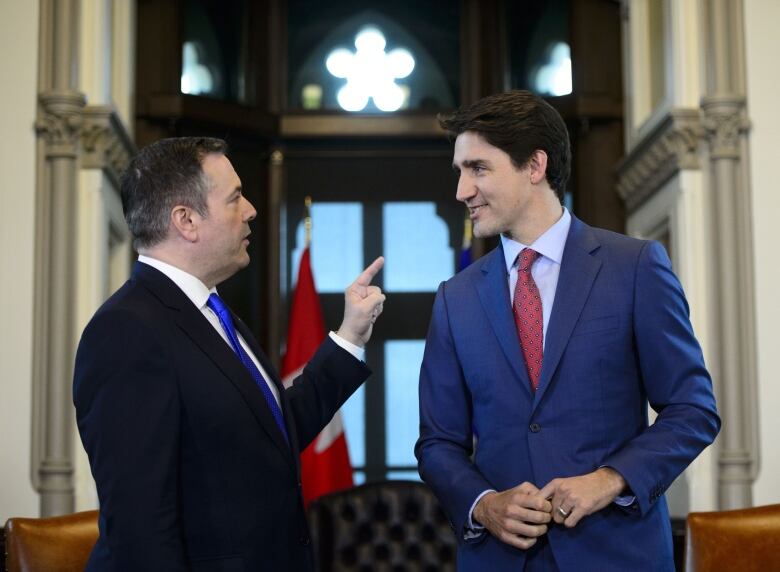UCPers feel Jason Kenney has pulled his punches in fight for a 'fair deal'
It's not only COVID that has the grassroots angry. They don't like how he's handled Ottawa either

Barely an hour after Alberta's top court declared the federal law on environmental approvals was unconstitutional, Jason Kenney found a lectern from which to herald his team's legal success. That it was at the University of Calgary's veterinary school didn't seem to matter.
The premier called it a "historic" decision and inaccurately said the Alberta Court of Appeal had struck down the Impact Assessment Act (it was a non-binding opinion; the law remains intact, pending an appeal to the Supreme Court).
"Today's victory is a huge vindication of Alberta's strategy to fight for a fair deal," he told the crowd. One he'd been long waiting for, he added.
The premier may have wished he didn't have to wait quite so long. This judgment landed one day before all ballots in his United Conservative Party leadership review had to arrive at the tallying centre in Edmonton so this couldn't factor into UCP members' decisions on Kenney's future.
Eastern promises
Over this lengthy stretch of conservative disillusionment with Kenney, his handling of COVID-19 has gotten most attention as the pointy end of the spear, or of the knives thrust into his back.
But if you keep talking to some of those who hope Kenney is the ex-leader later this week, the other big reason is how he has struggled to bring Ottawa to heel and carve out more autonomy for Alberta.
"Some politicians say, vote for Kenney, we need him to get Alberta a fair deal! What has he accomplished so far?" Jason Stephan, an openly dump-Kenney MLA,wrote in his local Red Deer Advocate in March.
Kenney would (and does) dispute that assertion. After all, he's the premier who launched a successful referendum to overhaul equalization, launched a veritable armada of lawyers to topple Ottawa policies like the carbon tax, created Alberta's own parole board and may follow suit with provincial police and pension plans plus more in the lengthy checklists Kenney is fond of elucidating in speeches.
And the upshot of those? Nobody can credibly argue the referendum thrust equalization reform "to the top of the national agenda,", as Kenneyhad insisted it would; Albertans still pay the federally mandated carbon tax, after a loss at the Supreme Court; the parole board averagesa mere six case reviews a month; and there's no sign of when or whether Alberta goes it solo on policing or pensions.

Kenney's tough-on-Ottawa record likely compares favourably to other premiers, both nationally and in recent Alberta history. But like his handling of the pandemic Kenney's pooh-poohed the masking and vaccination mandates he'd ultimately have to impose much of the internal grumbling rests in the gap between what the leader said and what he managed to do.
"Standing up for Alberta" was a key part of his election pitch, one of four chapters in the highly-detailed UCP platform. When he'd tick off the pieces of his "fight back" strategy during the 2019 election campaign, the fiery lines routinelygot the biggest cheers from UCP faithful.
The ups and downs
Kenney told reporters last week he's had "huge frustrations" among the "meaningful successes" in his provincial-federal approach.
"I've never expected that Alberta's list of demands for fairness in the federation would all be met under the Trudeau government, but that's not a reason to surrender. It's a reason to try harder."
He'd go on to list other wins, such as reaching not-so-onerous deals on industrial methane regulations and northern caribou herd management, and the $400 million boost for provincial coffers that came through Ottawa's tweaks to the fiscal stabilization fund.
Kenney says those hard-fought compromises were not "front-page stories," though they were also never the big applause lines delivered to a party faithful whose approval he needs to keep his job. Moreover, at the time of that fiscal reform in late 2020, Kenneycalled it a "slap in the face," because it didn't come near the $4.6 billion he was owed.
The premier also noted that Alberta's biggest federal file is the Trans Mountain pipeline expansion, and he credits Trudeau for determinedly supporting it; of course, most of the heavy lifting to get the Liberals to approve and then acquire that beleaguered project occurred before Kenney won as premier, when he was far less in the Trudeau-credit-giving habit.
The uphill climb for Kenney isn't solely owing to a federal government that's not disposed to give Alberta everything its premier wants. Since the pandemic hit, Albertans' mood toward Ottawa seems to have eased, and the general population hasvoiced distaste for major moves like an Alberta pension plan or policing agency.
Those who remain more hawkish are in the UCP base or are yearning for leadership to bring them back in the fold Brian Jean and Danielle Smith, former Wildrose Party leaders and Kenney critics, have been making noises along those lines, as has Drew Barnes, the MLA whom Kenney placed on the Fair Deal panel but is now exiled from the UCP caucus.

As with COVID, Kenney has had to balance his party's expectations with the opposing views of the rest of Alberta, along with the practical realities that might guide a governing politician's hand away from decisions that could, say, cost a fortune or otherwise weaken the provincial future.
Even with the judicial decision that Kenney had sought on what he's branded the "No More Pipelines Act," the Supreme Court could ultimately overturn it and preserve the Liberals' assessment system, just as the high court did with the Alberta Court of Appeal'sinitial ruling against the carbon tax.
But that verdict will ultimately come months after the decision that Kenney's partisans make on the rest of his mixed list of achievementsand things left unaccomplished.












_(720p).jpg)


 OFFICIAL HD MUSIC VIDEO.jpg)
.jpg)



























































































